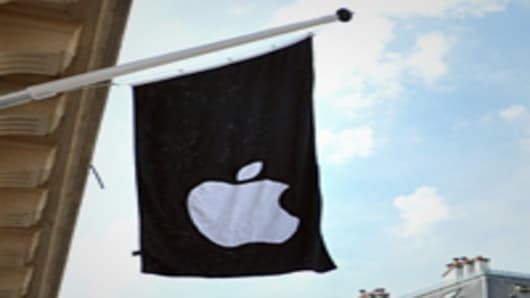Earnings news from the likes of Coca-Cola, Goldman Sachs and J&J should help guide stocks Tuesday, but traders will most intently be watching the trading activity in Apple.
The darling of Wall Street, Apple has seen its worst bout of selling since the market was bottoming in late September and early October. As of Monday, Apple lost nearly 9 percent in five days, and the stock finished down 4.2 percent Monday, near its intraday low, at $580.13.
Apple is now down just under 10 percent from its record intraday high of $644.00 on April 10, as a number of factors combined to drive down its shares. In the past week, there was news of a Justice Department suit against Apple and publishers, alleging collusion on e-book pricing.
There were also concerns raised by a BTIG analyst about iPhone pricing and the ability of customers to upgrade. There have also been worries about iPad sales, and on Monday, PiperJaffray said NPD data showed a five percent decline of Mac sales in the March quarter, versus the 14 percent increase expected by analysts.
But traders and strategists are also watching Apple’s technicals, which signal to some it still has a ways lower to go, after its rapid move above $600. How much it will fall is up for debate, since the company reports earnings next week, and that could prove a positive catalyst, or not.
Apple’s moves are also worrisome because of its out-sized influence on the stock market.
Apple has contributed 15.3 percent to the S&P 500 stock return year-to-date, and 46 percent to the S&P 500 Information Technology sector, according to Howard Silverblatt, Standard and Poor’s index analyst. Silverblatt said more than $90 billion was traded in Apple in the past five sessions, twice the average.
“I think the parabolic nature of the up move always ends one way. I’m not saying it’s happening in the short term, but I see more downside chart-wise,” said Miller Taback strategist Peter Boockvar. “Fundamentally, I’m not giving it an opinion.”
Apple broke its 20-day moving average Friday, for the first time since December. Stock Traders Almanac ponders whether the selling in Apple is due to investors raising cash to pay taxes, ahead of tax day, which is Tuesday this year.
“The air is coming out, and we can list a number of fundamental reasons. But either way, it’s a stock that’s gone from $400 to $600 in a couple of months. After that you have to be wary,” said Boockvar.
Oppenheimer Asset Management’s chief market technician Carter Worth said he’d be a seller of Apple. He described it, in a note, as way too far above its 150-day moving average (about $450). “Bottom line: we’re sellers. Presumption is the stock breaks trend in the day/days ahead.”
Worth, however, said Coca-Cola was a buy. Coke “stock recently broke out to new 52-week highs and now has pulled back gently to a level where support comes into play and where a reassertion of strength is likely. What’s not to like,” he wrote.
What to Watch
Coke is among the dozens of companies reporting earnings Tuesday. Also on the list besides Goldman and Johnson & Johnson are U.S. Bancorp, Northern Trust, State Street, Burberry’s, Comerica, Forest Labs, WW Grainger and Omnicom. IBM and Intel report after the closing bell.
Tuesday’s economic reports include housing starts at 8:30 a.m. ET and industrial production, at 9:15 a.m.
Economic reports were mixed Monday, with a negative report, showing a decline in home builder sentiment. But retail sales, were up 0.8 percent, better than expected.
Monday’s market was oddly divergent, with utilities and financials leading. The S&P 500was down less than one point at 1369, but the Dow was up 71 at 12,921. The Nasdaq, pulled lower by Apple and Google , was down 22 to 2988. Some stocks that had been market winners were dumped, along with Apple, such as high flying Priceline.
Stocks moved higher in the early afternoon as the euro jumped. The euro had fallen below 1.30 for the first time in two months early in the day, but moved back up above 1.31 in a short squeeze.
The euro and Europe will continue to be a focus Tuesday, as Spain conducts bill auctions, ahead its auction of longer duration bonds on Thursday. Spanish yields rose above 6 percent Monday, and Italian yields also continued to rise.
Meanwhile, Spain’s energy company Repsol has its own problems. The Argentine government Monday moved forward with plans to nationalize energy company YPF, a company that is majority held by Repsol. YPF represents 42 percent of Repsol's total reserves, estimated at 2.1 billion barrels of crude.
The price Argentina would pay Repsol is to be decided by the National Court of Appraisals. Citigroup analysts noted that they believe the government will try to pay book value, or about $4.3 billion dollars. “If this prognosis materializes, then it is likely Repsol will take the case to international arbitration,” they noted.
They also said it is negative for Argentina, from an international relations perspective and also for its business environment. But “the initiative will likely be politically popular and that (President) Cristina Fernandez de Kirchner will likely witness an uptick in her approval ratings.”
In a major development in the U.S. energy industry, regulators Monday approved Cheniere Energy’s plan to build an export plant for liquefied natural gas at Sabine Pass in Louisiana, the first of its type in 50 years.
Cheniere’s stock moved higher in afterhours trading, and has been rising on speculation it would receive approval. Cheniere expects to have the plant operational by 2015.
Follow Patti Domm on Twitter:@pattidomm
Questions? Comments? Email us at marketinsider@cnbc.com



